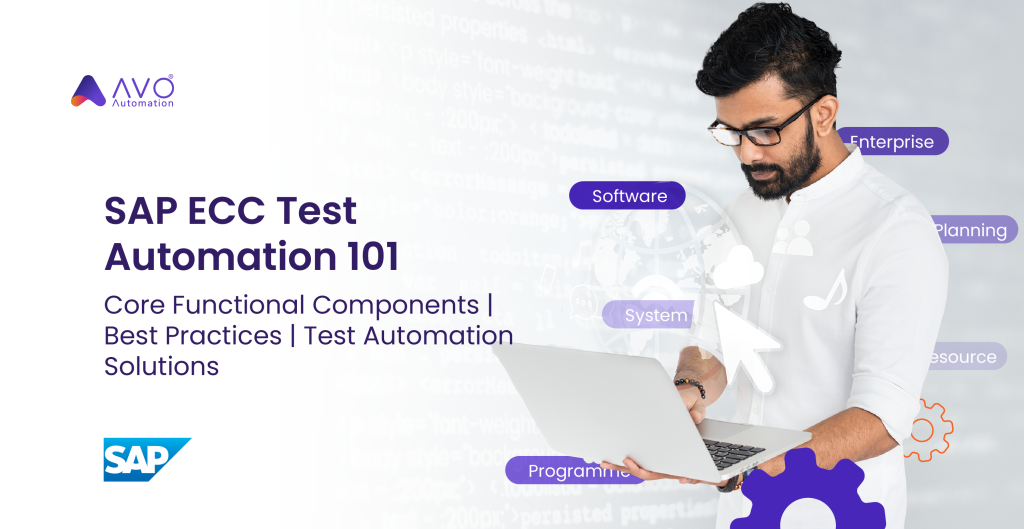SAP ERP Central Component (ECC) serves as the backbone for enterprise resource planning, offering medium and large organizations an integrated platform to streamline key business processes. From financial accounting to supply chain management, SAP ECC facilitates seamless data flow across departments, enabling more informed decision-making and greater operational efficiency.
In today’s competitive landscape, ensuring the performance and reliability of these critical components is paramount. This blog outlines the key functional components of SAP ECC and offers practical insights into how businesses can effectively test them to maintain high performance, reduce downtime, and support operational goals.
SAP ECC: A Core Business Solution
SAP ECC is designed to integrate data from various business functions in real-time. By synchronizing processes across departments like finance, sales, procurement, and production, SAP ECC empowers businesses to optimize resources, enhance productivity, and improve overall operational performance. It forms the foundation of SAP’s broader Business Suite, supporting a wide array of industries, including manufacturing, retail, pharmaceuticals, and consumer goods.
Core Functional Components of SAP ECC
To fully understand SAP ECC, it’s essential to explore its core functional components. Each component plays a unique role in managing specific business processes:
1. SAP FICO (Finance & Controlling)
- Business Function: FICO enables businesses to manage their financial transactions, accounting, and reporting while maintaining cost planning and control. It helps consolidate financial data and supports better financial forecasting.
- Testing Focus: Testing SAP FICO requires validating financial reports, ensuring accurate cost allocations, and confirming that accounting processes are correctly integrated with other modules like Sales and Distribution (SD) and Materials Management (MM).
2. Sales and Distribution (SD)
- Business Function: SD handles the complete sales cycle, from order management to billing and returns, ensuring smooth distribution of goods or services.
- Testing Focus: Focus on testing the end-to-end sales process, including order creation, delivery scheduling, and invoicing. Cross-module testing with FICO and MM ensures accurate order-to-cash workflows.
3. Materials Management (MM)
- Business Function: MM manages procurement and inventory, ensuring timely availability of materials for production and sales.
- Testing Focus: Key testing areas include purchase order processing, inventory updates, and stock transfers. Ensuring seamless integration with Production Planning (PP) and Quality Management (QM) is vital for a fully synchronized supply chain.
4. Production Planning (PP)
- Business Function: PP supports manufacturing operations by aligning production schedules with customer demand and material availability.
- Testing Focus: Testers need to validate production orders, capacity planning, and materials planning workflows. Cross-checking integration with MM and SD ensures efficient production management.
5. Quality Management (QM)
- Business Function: QM ensures that products meet quality standards by integrating quality control processes into procurement and production workflows.
- Testing Focus: Focus on automating quality inspections during procurement and production processes. Ensure seamless data transfer between MM, PP, and SD for improved quality assurance.
6. Plant Maintenance (PM)
- Business Function: PM manages the maintenance of enterprise assets, supporting preventive and corrective maintenance strategies to reduce downtime.
- Testing Focus: Testing should cover maintenance planning, work order creation, and cost management. Integration testing with MM for material requisition and FICO for cost allocation is essential for proper asset management.
7. Human Capital Management (HCM)
- Business Function: HCM manages employee-related functions, including payroll, time management, and employee development.
- Testing Focus: Accurate payroll processing, compliance with local tax regulations, and employee data management should be prioritized in testing. Integration with financial and HR systems is also critical.
8. Customer Services (CS)
- Business Function: CS oversees customer equipment maintenance and after-sales service, including billing for maintenance services.
- Testing Focus: Validate service requests, scheduling, and invoicing processes. Ensure that parts procurement and distribution functions integrate smoothly with MM and SD.
9. Project System (PS)
- Business Function: PS manages large-scale projects, ensuring that all project-related procurement, production, and costing are accurately tracked and monitored.
- Testing Focus: Prioritize testing project cost tracking, resource allocation, and adherence to timelines. Ensure integration with FICO and MM for real-time updates on project expenses and material availability.
Best Practices for Testing SAP ECC
Testing SAP ECC’s diverse components can be complex due to the system’s vast interdependencies. A robust testing strategy ensures that all components function as intended, minimizing business disruptions and enhancing system performance. Here are key practices to test SAP ECC efficiently:
1. Automated Testing for Speed and Accuracy
Automation is crucial to streamline testing for SAP ECC. A solution like Avo Assure, a no-code test automation platform, enables organizations to accelerate testing and improve accuracy by automating repetitive test cases. Automated tests offer rapid feedback and enhance test coverage, significantly reducing manual effort and human error.
2. Comprehensive Cross-Module Testing
Since SAP ECC components are highly interdependent, cross-module testing is critical to ensure smooth data flow. For instance, a sales order entered in SD must trigger updates in FICO, MM, and other relevant modules. Cross-module testing ensures all workflows and transactions are properly synchronized.
3. Data-Driven Testing for Real-World Scenarios
SAP ECC’s reliance on real-time data means that testing should simulate real-world scenarios. Data-driven testing allows you to run various test cases with different data inputs, ensuring the system can handle diverse business situations without errors or inconsistencies.
4. Parallel Testing for Efficiency
Parallel testing is an efficient way to execute multiple tests simultaneously, ensuring that modifications to one component do not disrupt others. This is especially useful in large-scale SAP implementations where various departments rely on interconnected processes.
5. Test Case Prioritization
Given the complexity of SAP ECC, it’s important to prioritize testing high-impact areas, such as finance, procurement, and sales processes. This ensures critical business functions are thoroughly tested, reducing the risk of system failure during operations.
Test Automation Tools for SAP ECC
Testing SAP ECC’s intricate system landscape is a complex and time-consuming task, especially given its various functional components and their interdependencies. Test automation tools can significantly streamline the testing process, reduce manual effort, and ensure comprehensive test coverage. Here are some of the most effective test automation tools for SAP ECC:
1. Worksoft Certify
- Overview: Worksoft Certify is a no-code automation platform designed for enterprise applications like SAP. It provides automated business process testing, ensuring that SAP components work smoothly across the entire business landscape.
- Key Features: Business process capture, seamless integration with SAP S/4HANA, and real-time analytics.
- Best Suited For: Large enterprises that require automated functional testing for complex business processes and frequent updates.
2. Tricentis Tosca
- Overview: Tricentis Tosca is another popular tool that enables model-based test automation for SAP environments. It simplifies the automation of functional and regression testing with its script-less approach.
- Key Features: Model-based testing, risk-based prioritization, and seamless SAP GUI testing.
- Best Suited For: Enterprises looking for risk-based testing and automated regression testing across SAP ECC and other enterprise systems.
3. Micro Focus UFT (Unified Functional Testing)
- Overview: Micro Focus UFT offers a robust, automated testing platform for functional, regression, and GUI testing. Its ability to integrate with various enterprise systems makes it a strong choice for SAP ECC environments.
- Key Features: AI-driven test automation, cross-browser and mobile testing, and extensive integration with SAP and other ERP systems.
- Best Suited For: Organizations needing automated functional testing for SAP components with a focus on scalability and cross-platform compatibility.
4. Selenium
- Overview: Selenium is an open-source automation tool best known for web-based application testing. While not SAP-specific, it can be customized for testing web interfaces and SAP portals.
- Key Features: Extensive customization, support for multiple browsers, and integration with other test automation frameworks.
- Best Suited For: Teams with technical expertise that need flexible, browser-based test automation.
5. Avo Assure
- Overview: Avo Assure is a no-code, heterogeneous test automation solution specifically designed for SAP applications, enabling end-to-end business process testing with ease.
- Key Features: SAP-specific pre-built keywords, parallel test execution, smart scheduling, and cross-platform compatibility. Avo Assure is highly suited for businesses needing comprehensive, no-code automation of SAP ECC without the technical complexity.
- Best Suited For: Organizations seeking a user-friendly, no-code solution for SAP ECC testing that supports complex workflows, high test coverage, and faster release cycles.
Avo Assure for SAP ECC
For enterprises seeking an all-encompassing, easy-to-use solution for SAP ECC test automation, Avo Assure stands out as a top choice. Avo Assure is a heterogeneous, no-code test automation solution that offers comprehensive support for SAP applications. Its user-friendly interface and robust automation capabilities enable businesses to test SAP ECC effectively without the need for specialized coding knowledge.
Key Features of Avo Assure for SAP ECC
- No-Code Automation: Avo Assure empowers business users to automate complex test cases without writing a single line of code. This makes it ideal for organizations with limited technical expertise or those looking to democratize testing across the business.
- Pre-Built SAP Keywords: Avo Assure comes equipped with SAP-specific keywords that accelerate the automation of test cases. These pre-built keywords simplify the process of automating SAP ECC components like FICO, MM, and SD, drastically reducing the time spent on test script creation.
- Parallel Test Execution: Avo Assure supports parallel execution, allowing businesses to run multiple tests simultaneously across different SAP modules. This reduces testing time and speeds up release cycles.
- Smart Scheduling: With Avo Assure, businesses can schedule test executions at optimal times. This ensures that test cases are run during non-peak hours, minimizing disruption to ongoing operations and maximizing resource usage.
- Cross-Platform Compatibility: Avo Assure is designed to work seamlessly across various SAP ECC modules and other enterprise applications, providing comprehensive test coverage for both SAP-specific processes and third-party integrations.
- Improved Test Coverage and Accuracy: Avo Assure helps ensure that businesses achieve over 95% test coverage, reducing the risk of missing critical defects. Its automation capabilities allow organizations to test end-to-end business processes, ensuring accurate and reliable results.
Case Study: A Fortune 500 Medical Manufacturer
Avo Assure recently helped a Fortune 500 medical manufacturer automate its SAP ECC testing. With Avo Assure, the organization achieved a 4x improvement in test coverage and reduced manual testing effort by 69%, leading to better governance of end-to-end business processes. This enhanced automation also helped the company identify critical defects early, resulting in smoother operations and faster time to market.
Conclusion
The complexity of SAP ECC requires a strategic approach to testing, especially as businesses rely on the seamless operation of interconnected modules like FICO, MM, and SD. Leveraging advanced test automation tools such as Avo Assure allows enterprises to optimize their testing efforts, reduce errors, and accelerate the delivery of high-quality, fully tested solutions.
Avo Assure’s no-code approach, coupled with its robust SAP-specific features, makes it the perfect partner for businesses looking to automate SAP ECC testing at scale. By embracing automation, businesses can ensure smooth operations, improve test accuracy, and maintain system integrity in an increasingly competitive landscape.
Explore how Avo Assure can streamline your SAP ECC testing efforts. Schedule a demo today and see how our no-code test automation platform can transform your business.

